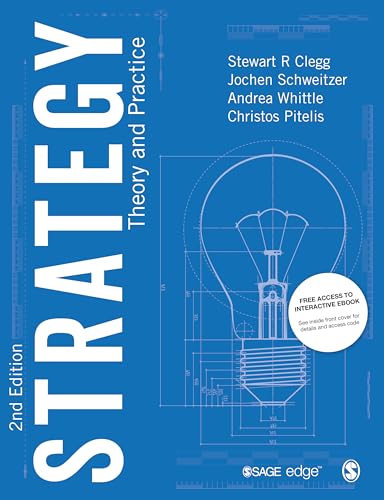Get 12 months FREE access to an interactive eBook when purchasing the paperback*
Updated to bring the material in line with the topical and contemporary ideas and debates on or about strategy and catering to students and their diverse learning styles, the second edition is an easy to use tool allowing students to switch from web resources to the print text and back again, opening windows on the world of strategy through cases that are vibrant and engaged, digital links that allow them to explore topics in more detail and video and other media that encourage relating theory to practice.
Providing a fresh perspective on strategy from an organizational perspective through a discursive approach featuring key theoretic tenets, this text is also pragmatic and emphasizes the practices of strategy to encourage the reader to be open to a wider set of ideas, with a little more relevance, and with a cooler attitude towards the affordances of the digital world and the possibilities for strategy’s futures.
The key areas of Strategy take a critical stance in the new edition, and also include areas less evident in conventional strategy texts such as not-for-profit organizations, process theories, globalization, organizational politics and decision-making as well as the futures of strategy.
The new edition comes packed with features that encourage readers to engage and relate theory to practice and is complemented by a
free Interactive e-book* featuring videos, cases and other relevant links, allowing access on the go and encouraging learning and retention whatever the reading or learning style.
Suitable as core reading for undergraduate and postgraduate business management students of strategy and strategic management.
*Interactivity only available through Vitalsource eBook included as part of paperback product (ISBN 9781473938458).
Access not guaranteed on second-hand copies (as access code may have previously been redeemed).
Stewart R. Clegg is retired as an Emeritus Professor of Management and Organization Studies at the University of Technology Sydney. He has published widely in the management, organizations and politics literatures in many of the leading journals. He is a Professor at The University of Stavanger, Norway and at Nova School of Business and Economics in Lisbon, Portugal. Widely acknowledged as one of the most significant contemporary theorists of power relations, he is also one of the most influential contributors to organization studies. He writes something every weekday and sometimes on wet weekends, usually with the digital ABC Jazz Radio playing in the background.
Jochen Schweitzer is
Associate Professor at the University of Technology Sydney (UTS). Trained as both an engineer and a social scientist, he concentrates his research on issues of strategy, entrepreneurship and innovation, with a special interest in design thinking and emerging technologies. Jochen also serves as the founding Faculty Director of UTS’s MBA in Entrepreneurship and Bachelor in Entrepreneurship (Honours) programs. He was Visiting Scholar at Stanford University and Hasso Plattner Institute (HPI) School of Design Thinking at Potsdam University. Jochen is a winner of the Strategic Management Societies′ Best Paper Award and he received Honourable Mention by the Strategic Management Division of the Academy of Management. Jochen is as a passionate educator, who has taught at universities in the UK, Japan, China, US, Germany, and New Zealand. Before becoming an academic, Jochen was Principal at PwC′s European Strategy Consulting practice.Andrea Whittle is Professor of Management at Newcastle University Business School and previously Head of the Strategy, Organization and Society Research Group. Before joining Newcastle University in 2013, Andrea held a Chair in Organization Studies at Cardiff University. Andrea started her academic career in Natural Science, then did a PhD in Sociology in the field of Science and Technology Studies and since then has taught Management in Business Schools. Andrea’s interest in strategy started without plan or design – much like many strategies themselves emerge. While doing an ethnography of a group of management consultants for her doctoral research, she was fascinated by the social, political, material and discursive processes through which the group tried to shape the firm’s strategy agenda, albeit not always successfully. Since then, she has gone on to develop a keen interest in strategy as practice, applying organization theory and social theory to the study of strategizing processes in a range of contexts. Her more recent work has included longitudinal ethnographic research on a strategy project team in a Multinational Corporation and work on how top managers account for their strategic decisions following crises and scandals. Central to all her work is a concern for understanding how discourse and power are implicated in all forms of organization – of which strategy is not an exception but an exemplar.
Chris Pitelis is Life Fellow, Queens’ College, University of Cambridge, co-editor of the Cambridge Journal of Economics and literary executor of the collected papers of Edith Penrose. Chris researches on sustainable international business strategy and governance, national and regional competitiveness. He published over ten books and circa a hundred articles in journals such as Academy of Management Review, Organization Science, Journal of International Business Studies, Strategic Entrepreneurship Journal, and The Leadership Quarterly. He has served as Dean of College, Head of School, Director of Research and Engagement Center, and visiting professor in leading Universities. He served at the editorial boards of leading journals, organized, presented and chaired numerous conferences, was invited speaker and coordinated projects, taught, consulted, trained and designed policies for international organizations, governments and regions, businesses and NGOs.
